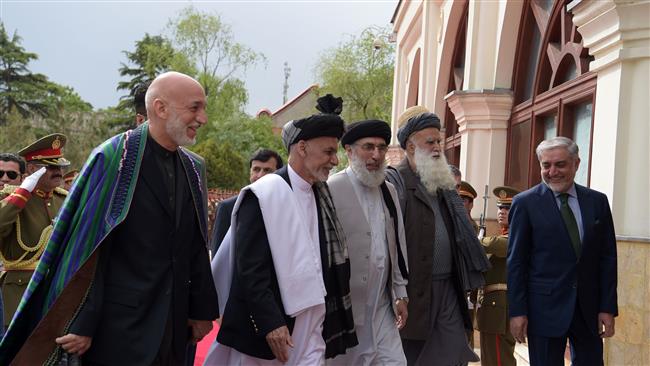Afghan warlord Hekmatyar returns to Kabul


Former Afghan warlord Gulbuddin Hekmatyar has returned to the capital Kabul eight months after signing a peace deal with the administration of President Ashraf Ghani.
After more than 20 years, Hekmatyar, who leads the country’s second largest militant group after Taliban, returned to Kabul on Thursday amid tight security.
His convoy was joined by several hundred vehicles of supporters.
The convoy, comprising of mainly pickup trucks equipped with machine guns, was greeted by a large number of onlookers as well.
The cheering fans sang the national anthem and chanted slogans such as “Welcome to Kabul, Honorable Hekmatyar.”
Ghani led an event to welcome Hekmatyar, a former prime minister, at the presidential palace and thanked him for “heeding the peace call.”
In the week ahead of his return, huge billboards sprang up around the city, but were quickly covered in paint or mud.
Hekmatyar is the latest in a series of controversial figures that Kabul has sought to reintegrate by granting judicial immunity for past crimes.
Back in September last year and following months of negotiations between Kabul and Hekmatyar, the two sides etched a landmark peace deal, which gave him and his followers immunity for past actions and granted them full political rights.
In February, upon Kabul’s request, the United Nations Security Council lifted sanctions against Hekmatyar, saying “assets freeze, travel ban and arms embargo set out in … Resolution 2253 (2015)” no longer applied to him. It also removed his name from its Daesh-linked group list.
The peace accord had been considered a symbolic victory for Ghani, who seeks to revive peace talks with the much stronger Taliban. The deal, however, sparked revulsion from human rights groups, which argue that it was too lenient toward the warlord and many of his militants.
Hekmatyar, a former anti-Soviet commander in the 1980s who waged a guerrilla war against the Soviet forces occupying Afghanistan, stands accused of leading the militancy that allegedly killed thousands of people, mostly civilians, in Kabul, during the 1992-1996 civil war.
In the wake of Taliban’s reign of terror in 2001, Hekmatyar was designated a “global terrorist” by the US for his alleged links to the al-Qaeda and Taliban militant groups and was hence forced to go into hiding.
Afghanistan has been gripped by insecurity since the United States and its allies invaded the country as part of Washington’s so-called war on terror in 2001. Many parts of the state remain plagued by militancy despite the presence of foreign troops.
During the past 16 years, the Taliban militants have been conducting terrorist attacks across the country, killing and displacing civilians.
In addition, the Daesh Takfiri terrorist group, which is mainly active in Syria and Iraq, has recently managed to take recruits from Afghan Taliban defectors. The rise of Daesh in Afghanistan has added to concerns about security situation of the country.







